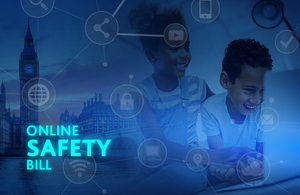Internet users are one step closer to a safer online environment as the government’s new world-leading online safety laws are brought before parliament today.
The Online Safety Bill marks a milestone in the fight for a new digital age which is safer for users and holds tech giants to account. It will protect children from harmful content such as pornography and limit people’s exposure to illegal content, while protecting freedom of speech.
It will require social media platforms, search engines and other apps and websites allowing people to post their own content to protect children, tackle illegal activity and uphold their stated terms and conditions.
The regulator Ofcom will have the power to fine companies failing to comply with the laws up to ten per cent of their annual global turnover, force them to improve their practices and block non-compliant sites.
Today the government is announcing that executives whose companies fail to cooperate with Ofcom’s information requests could now face prosecution or jail time within two months of the Bill becoming law, instead of two years as it was previously drafted.
A raft of other new offences have also been added to the Bill to make in-scope companies’ senior managers criminally liable for destroying evidence, failing to attend or providing false information in interviews with Ofcom, and for obstructing the regulator when it enters company offices.
Digital Secretary Nadine Dorries said:
The internet has transformed our lives for the better. It’s connected us and empowered us. But on the other side, tech firms haven’t been held to account when harm, abuse and criminal behaviour have run riot on their platforms. Instead they have been left to mark their own homework.
We don’t give it a second’s thought when we buckle our seat belts to protect ourselves when driving. Given all the risks online, it’s only sensible we ensure similar basic protections for the digital age. If we fail to act, we risk sacrificing the wellbeing and innocence of countless generations of children to the power of unchecked algorithms.
Since taking on the job I have listened to people in politics, wider society and industry and strengthened the Bill, so that we can achieve our central aim: to make the UK the safest place to go online.
In the UK, tech industries are blazing a trail in investment and innovation. The Bill is balanced and proportionate with exemptions for low-risk tech and non-tech businesses with an online presence. It aims to increase people’s trust in technology, which will in turn support our ambition for the UK to be the best place for tech firms to grow.
The Bill will strengthen people’s rights to express themselves freely online and ensure social media companies are not removing legal free speech. For the first time, users will have the right to appeal if they feel their post has been taken down unfairly.
It will also put requirements on social media firms to protect journalism and democratic political debate on their platforms. News content will be completely exempt from any regulation under the Bill.
And, in a further boost to freedom of expression online, another major improvement announced today will mean social media platforms will only be required to tackle ‘legal but harmful’ content, such as exposure to self-harm, harassment and eating disorders, set by the government and approved by Parliament.
Previously they would have had to consider whether additional content on their sites met the definition of legal but harmful material. This change removes any incentives or pressure for platforms to over-remove legal content or controversial comments and will clear up the grey area around what constitutes legal but harmful.
Ministers will also continue to consider how to ensure platforms do not remove content from recognised media outlets.
Minister of State for Security and Borders Damian Hinds said:
As a society and as individuals, the internet has broadened our horizons and given us new opportunities to connect globally. But alongside this, the most depraved criminals have been given fresh avenues to exploit vulnerable people and ruin lives, whether that be by stealing the innocence of children or destroying finances.
Our utmost priority is to protect children and ensure public safety. The trailblazing Online Safety Bill will ensure social media companies are finally held to account and are taking ownership of the massive effect they have on all of our lives. Fraudsters will have fewer places to hide and abusers will be ardently pursued to feel the full force of the law.
Bill introduction and changes over the last year
The Bill will be introduced in the Commons today. This is the first step in its passage through Parliament to become law and beginning a new era of accountability online. It follows a period in which the government has significantly strengthened the Bill since it was first published in draft in May 2021. Changes since the draft Bill include:
- Bringing paid-for scam adverts on social media and search engines into scope in a major move to combat online fraud.
- Making sure all websites which publish or host pornography, including commercial sites, put robust checks in place to ensure users are 18 years old or over.
- Adding new measures to clamp down on anonymous trolls to give people more control over who can contact them and what they see online.
- Making companies proactively tackle the most harmful illegal content and criminal activity quicker.
- Criminalising cyberflashing through the Bill.
Dame Melanie Dawes, Ofcom Chief Executive, said:
Today marks an important step towards creating a safer life online for the UK’s children and adults. Our research shows the need for rules that protect users from serious harm, but which also value the great things about being online, including freedom of expression. We’re looking forward to starting the job.
Ian Russell, Molly Rose Foundation, said:
The Molly Rose Foundation and Molly’s family urge Parliamentarians to deliver a safer internet for all, especially our young. The first reading of the Online Safety Bill in Parliament is another important step towards ending the damaging era of tech self-regulation. Increasingly, we are all reminded of the appalling consequences created by harmful online content.
Even nations and governments can struggle to protect themselves from the damaging use of digital technology, so we must do more to safeguard the lives of our young and vulnerable. It is time for the laws, regulations, and freedoms of our offline democracies to be reflected in the digital domain.”

















